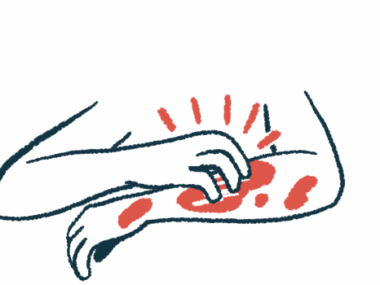Woman with HCP free of porphyria symptoms 2 years after Givlaari use
Her porphyrins levels stayed in normal range after 6 months of treatment
Written by |

Treatment with Givlaari (givosiran) was effective for resolving symptoms of hereditary coproporphyria (HCP) in a 47-year-old Japanese woman, according to a recent report.
Her symptoms remained well-controlled for more than two years after stopping Glivlaari, according to the report, “A Case of Hereditary Coproporphyria in which the Patient’s Course Improved after the Discontinuation of Givosiran,” published in the journal Internal Medicine.
Givlaari, given once monthly, is approved to treat acute hepatic porphyrias
The woman had been diagnosed with porphyria in her mid-30s, and she experienced frequent bouts of abdominal pain that often required hospitalization. It wasn’t until about a decade after porphyria was first suspected that she underwent genetic testing, which revealed a mutation in the CPOX gene and confirmed the diagnosis of HCP.
In early 2021 — about a year before HCP was definitively diagnosed — she started treatment with Givlaari, given by an under-the-skin (subcutaneous) injection once monthly.
Givlaari is an approved treatment for acute hepatic porphyrias, a group of diseases that includes HCP along with a few other types of porphyria. The treatment was approved in the U.S. and Europe based on data from a Phase 3 trial that included more than 90 porphyria patients. But only one trial participant specifically had HCP, which is rare even compared to other forms of porphyria.
For the woman in this report, Givlaari led to a rapid improvement in disease symptoms. Levels of porphyrins — intermediary molecules that accumulate to toxic levels in porphyria — dropped to normal levels soon after she was started on the treatment.
“Our patient had no attacks or chronic manifestations during the 6 months of givosiran treatment, during which her urinary [porphyrin] levels were reduced and remained within the normal ranges,” the scientists wrote.
She received a total of six injections of Givlaari over the course of six months. During this time, she began experiencing alopecia (hair loss) and showed signs of treatment-related kidney problems. Due to these side effects, she stopped taking Givlaari.
After discontinuing treatment, her hair regrew quickly and her kidney function gradually returned to normal. Over the more than two years of follow-up since, she has had no recurrence of porphyria symptoms, and her porphyrin levels remain within normal ranges.
The scientists noted that, while Givlaari treatment likely helped set the stage for these long-term improvements, other factors probably were also at play. In particular, they noted that porphyria symptoms tend to ease after menopause due to hormonal changes, which may have contributed to long-term symptom relief in this patient.
Givlaari is sold by Alnylam Pharmaceuticals, which was not involved in this report.






